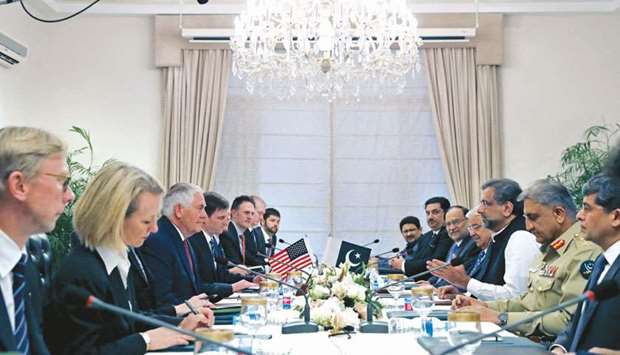Prime Minister Shahid Khaqan Abbasi yesterday reconfirmed Pakistan’s commitment to the “war on terror” during a meeting with US Secretary of State Rex Tillerson, saying his country had “produced results” fighting the region’s militants.
Tillerson, on a tour of Asia and the Middle East, arrived in Pakistan yesterday afternoon and met with Abbasi, as well as Pakistan’s powerful army chief, General Qamar Javed Bajwa.
“We are committed in the war against terror,” Abbasi told Tillerson, as the two men sat facing each other on a long table.
“We have produced results. And we are looking forward to moving ahead with the US and building a tremendous relationship,” added Abbasi, who sat next to Bajwa.
During a short part of the meeting available to media, Tillerson told the Pakistani delegation that the nuclear-armed nation was an important US ally in the region.
“(Pakistan is) important regionally to our joint goals of providing peace and security to the region and providing opportunity for greater economic relationship as well,” Tillerson said.
US officials say they are frustrated that Afghan Taliban and Haqqani militants are afforded freedom of movement and are able to transport weapons and raise funds inside Pakistan, something their Islamabad counterparts staunchly deny.
On Monday, during a visit to Kabul, Tillerson urged Pakistan to act against safe havens on its soil.
“Pakistan needs to, I think, take a clear-eyed view of the situation that they are confronted with in terms of the number of terrorist organisations that find safe haven inside of Pakistan.”
Pakistani officials bristle at the idea that the country is not doing enough against militants and say Pakistan has suffered more than 60,000 casualties in the war on terror since the Sept 11 attacks in United States in 2001.
In recent years Pakistan has made substantial gains against militants and the number of attacks have drastically reduced, but some militant groups such as the Pakistani Taliban and the Islamic State continue to pose a threat and have periodically staged large-scale attacks.
Pakistan recently started to fence its long and porous 2,500-km border with Afghanistan in an attempt to stop militants criss-crossing the frontier.
As well as support for the Afghan Taliban and the Haqqani network, another sticking point in the relationship has been growing closeness by the United States to India, Pakistan’s arch-foe and neighbour.
Tillerson said last week that the Trump administration wanted to “dramatically deepen” co-operation with New Delhi, partly to offset Chinese influence in Asia.
Trump has also called for greater Indian role in Afghanistan.
But this deepening in ties has alarmed Pakistan, which has rejected a greater political role for India for Afghanistan as a “red line” for Islamabad.
The secretary’s visit, the first to Pakistan by a senior Trump administration official, comes months after the US President angrily accused Islamabad of harbouring “agents of chaos” who could attack US-led Nato forces in neighbouring Afghanistan.
It follows on the heels of an unannounced stop in Afghanistan on Monday, where Tillerson reiterated America’s commitment to the country and warned that Washington has made “very specific requests” of Pakistan seeking to “undermine the support that the Taliban receives”.
Pakistan has repeatedly denied the charge, insisting it maintains contacts only to try to bring the militants to peace talks.
During his brief visit to Afghanistan’s Bagram air base Monday, Tillerson told reporters Pakistan needs to “take a clear-eyed view of the situation that they are confronted with in terms of the number of terrorist organisations that find safe haven inside” the country.
US and Pakistani sources say his visit to Islamabad will be followed later in the year by Defence Secretary Jim Mattis as Trump seeks to send a tough message to the wayward Cold War ally.
The US-Pakistan relationship has waxed and waned dramatically since Trump took office in January.
Pakistan said the President had praised its then-prime minister Nawaz Sharif as “terrific” in an effusive phone call when Trump took office in January.
But Trump’s blistering speech in August accusing Pakistan of harbouring militants saw Islamabad angrily hit back at the claims, insisting the US took no account of the thousands of lives lost and billions spent in fighting extremism.
Following the August speech, Tillerson cautioned Pakistan that it could lose its status as a privileged military ally if it continued providing support to Afghan militant groups.
As one of 16 “Non-Nato Major Allies”, Pakistan benefits from billions of dollars in aid and has access to advanced US military technology banned from other countries.
However political analyst Zahid Hussain said there may be little Islamabad can do at this point to convince the US that it had prevented militants from using its territory to target forces in Afghanistan.
“I think they would like to assure to the Americans that they are sincere and they are taking action against some of the groups,” Hussain said.
“The perception here is whatever they do, it is not going to please the Americans.”
Earlier this month Pakistani forces acting on American intelligence rescued a US-Canadian family which had been in Taliban captivity for five years, sparking hopes that ties were on the mend.
The rescue was followed by a series of drone strikes on both sides of the Afghanistan-Pakistan border targeting long-time foes of both Washington and Islamabad.
The US has vowed to send more than 3,000 additional troops to Afghanistan, on top of the 11,000 already deployed there, to train and advise Afghan troops and police as part of a new strategy outlined by the administration.

US Secretary of State Rex Tillerson sits across from Pakistani Prime Minister Shahid Khaqan Abbasi during their meeting at the Prime Minister’s residence in Islamabad yesterday.
